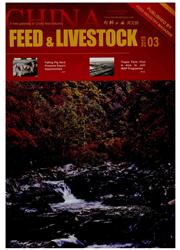

 中文摘要:
中文摘要:
试验采用单因子完全随机试验设计,以玉米和豆粕为主要原料配制基础日粮,将450只1日龄雌雄各半的健康艾维茵肉鸡,随机分为5个处理组,每个处理组设6个重复,每重复组15只鸡,试验期42d。维生素A的5个添加水平分别为3000、6000、15000、30000和60000IU/kg。在整个试验期内,与3000、6000IU/kg维生素A组相比,30000、60000IU/kg维生素A组的肉鸡生长速度与饲料转化效率有趋于显著的下降趋势(P〈0.10),15000IU/kg维生素A组生长速度也有降低的趋势。随日粮维生素A水平的增加,肉鸡对日粮粗蛋白质与钙的消化率呈一次线性降低趋势(P〈0.10),其中,日粮维生素A水平为3000~6000IU/kg时消化率较高,维生素A水平为30000~60000IU/kg时较低。日粮维生素A水平为15000IU/kg时,提示肉鸡维生素A临界过量;日粮维生素A水平达到30000IU/kg以上时,提示肉鸡维生素A过量。
 英文摘要:
英文摘要:
A total of four hundred and fifty 1-d-old Arbor Acre half male and half female broilers with similar body weight were randomly allotted into five treatments with six replicates in every treatment and fifteen chickens each replicate. The trial lasted for forty-two days. Broilers were fed five levels of dietary vitamin A (3 000,6 000,15 000,30 000,60 000 IU/kg) in a single factorial arrangement. The results showed that growth rates and feed conversion efficiency had a significant tendency to be decreased along with the increment of vitamin A additive dose (P〈0.10), and the addition of 3 000,6 000 IU/kg vitamin A to the diet was higher, and the addition of 30 000,60 000 IU/kg vitamin A to the diet was lower, and the growth rates also had the tendency to be decreased at the supplementation of 15 000 IU/kg vitamin A to the diet. Vitamin A decreased crude protein and calcium digestibility of broilers in a linear dose-dependent manner (P〈0.10), and the supplementation of 30 000 - 60 000 IU/kg vitamin A to the diet was more effective, however, the supplementation of 3 000 - 6 000 IU/kg to the diet was less effective. The results implyed that the addition of 15 000 IU/kg vitamin A to the diet would be marginally excessive for broilers, and that the addition of above 30 000 IU/kg vitamin A to the diet would be excessive for broilers.
 同期刊论文项目
同期刊论文项目
 同项目期刊论文
同项目期刊论文
 期刊信息
期刊信息
